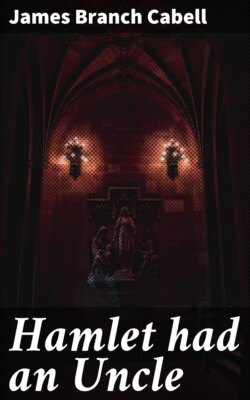Читать книгу Hamlet had an Uncle - James Branch Cabell - Страница 12
На сайте Литреса книга снята с продажи.
Оглавление9
Table of Contents
SAILING OF THE SEA-HAWK: HAMLET AND HIS MOTHER
Table of Contents
It is related how, at Fengon's orders, they manned the Sea-Hawk. So was it with a suitable magnificence, which in some degree soothed his paternal regrets, that Fengon sent Hamlet towards death, because in all Jutland there was no ship more splendid than the Sea-Hawk.
The story says that this vessel, builded soundly out of oak and riveted with iron, was long and slender, with thirty benches for the rowers. Her sails were striped, crosswise, with blue and yellow; and upon each sail a scarlet dragon (since Queen Geruth was the daughter of a Harfaager) struggled and ramped aspiringly. The ship's prow was a rigid and more emaciated dragon, gilded and having large red eyes; the outward sides of the vessel were adorned handsomely with bands of red and of yellow ochre. Abaft, hung over the bulwarks of the Sea-Hawk the sixty shields of her rowers, each shield displaying its own bright design; they glittered in the sunlight; and from the slowly moving oars of the Sea-Hawk, now that, upon this superb forenoon, she turned southwards from the harbour at Blokhus, the waters of Skagerrak splattered and dripped, with a pleasantly dispersed radiancy, sparkling like gems.
These drops of water were as salty and as copious as the unavoidable tears of a bereaved father, Fengon reflected sadly. That fancy pleased him; yes, it was neat: but no simile could make cheerful, and no refinements of ornate rhetoric could ever hope to veil with the tinsels of æsthetic approval, the fact that aboard the Sea-Hawk sailed Fengon's only child going towards the supernal pleasures of Valhalla. Fengon hiccoughed; and then dried his eyes with a dignity which his sound knowledge of classical writers, as opposed to his experience of court life, had taught him to think suitable for a king in anguish.
Now the tale tells likewise that before leaving Jutland, Prince Hamlet spoke with his mother, of whom he made three requests. The first of these was that she should keep safe the sticks of kindling wood which he had sharpened. He required also that she should have the banquet hall of the castle hung with fresh tapestries nailed to the walls. And this third asking was that during the forenoon of his approaching birthday, if by this time he had not returned into Jutland, she should cause to be celebrated his funeral.
'Some new tapestries would be an excellent notion in that big wooden barn of a room out in those bare fields, my dear poor son,' the Queen replied. 'The whole place does want brightening up, as I have been telling your father for Heaven only knows how long, because I might as well have been talking to a bed post. But no, Hamlet, not a funeral. In fact, I must have suggested it dozens and dozens of times, along with two more fireplaces, so that the gentlemen could get drunk in comfort without actually freezing. Fengon is like all other men and never does seem to understand the plain need of such things. And the sticks, of course, will be no special trouble, on the top shelf in the closet.'
'Then, madam, all is settled----'
The Queen answered: 'I must say I am glad you agree with me about the tapestries, Hamlet, because you mean rather plain red ones, I suppose, with just a dignified amount of goldwork, nothing gaudy. It would be, in fact, a saving in the long run. But a funeral appears to me quite unnecessary. A funeral would be a sheer waste of money, my dear son--and especially on your birthday--unless you came to it. I do not see whatever could have put such a morbid idea in your head, when we have so much to be thankful for, after all, if one only looks at matters in the right way. I mean, if you came to the funeral carried by your pall-bearers, just as we all have to do in the end.'
Here the Queen paused, to sigh religiously.
Hamlet said, 'Yet, madam, this is an idea which was put into my head by the wisest person whom I have known.'
'Now but was it indeed! Poor dear Corambus!' said the Queen.
'No, madam; I did not mean Corambus.'
'Nobody, Hamlet, ever had a finer mind in Jutland, or a more pleasant disposition either,' the Queen stated reprovingly. 'For that reason, my dear son, I really do feel compelled to say that while I believe in letting bygones be bygones, and not nagging at people for ever, still, at the same time! You see, it is not as if your own mother did not understand the better side of your nature, Hamlet, but far otherwise. And that reminds me you have not as yet told me, my son, who is this other so very wise person.'
'Why, but upon my word, madam, I do not know. Nor'--Hamlet added, a bit gloomily--'nor do I care to know.'
So was it Orton came into the story.
